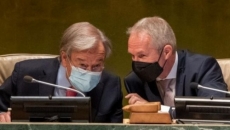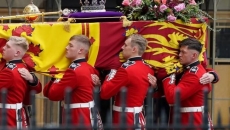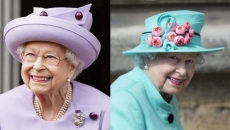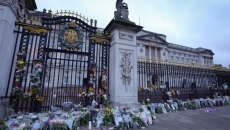WASHINGTON - He's hell-bent on restoring blue-collar American manufacturing to its former glory, considers free trade a dirty word and wants Canada to wade voluntarily into a failed, gang-ravaged state that's a quagmire waiting to happen.
To be sure, Joe Biden is no Donald Trump. But he doesn't always make it obvious.
The U.S. president arrives in Ottawa tonight on a whirlwind 24-hour visit — a significantly less elaborate itinerary than first envisioned in the Prime Minister's Office — two full years since becoming commander-in-chief.
"This will be the first true, in-person bilateral meeting between the two leaders in Canada since 2009," said White House National Security Council spokesman John Kirby.
The first year of Biden's term focused on rebuilding Canada-U.S. relations following Trump's divisive term in office. The second focused on meeting obligations, "including prioritizing orderly and safe migration through regular pathways," Kirby said.
"Now, heading into the third, this visit is about taking stock of what we've done, where we are and what we need to prioritize for the future."
While he's far less undiplomatic and publicly combative than his both-barrels predecessor, Biden's first two years in the Oval Office produced more than enough political headaches for Prime Minister Justin Trudeau.
Friday's meetings may not offer much remedy.
High on Canada's wish list will be frank talk on Buy American, the age-old protectionist doctrine resurrected by every 21st-century president short of George W. Bush and one of Biden's favourite domestic political messages.
"The president is very committed to policies that create jobs in the United States, and we don't take issue with that policy," said Kirsten Hillman, Canada's ambassador to the U.S.
"What we say is … when you apply it to Canada and deeply integrated Canada supply chains, it does not serve your policy purpose. It does the exact opposite."
Fully 60 per cent of the physical goods that Canada sells stateside "go into the manufacturing of other products," and much the same is true of what Canada buys from the U.S., she added.
"So if we start carving each other out of our supply chains, the economic impact on jobs in our own country is going to be enormous. We're shooting ourselves in the foot, essentially — both countries."
Canada is also likely to be playing defence on Haiti, the impoverished, quake-ravaged Caribbean nation on the island of Hispaniola that has devolved into a failed state since the 2021 assassination of president Jovenel Moïse.
Roving gangs of marauders now control more than half of Port-au-Prince, the capital city of a country in the grips of a cholera outbreak with little access to medical help, a near-total lack of public security and a powerless interim government.
The Biden administration, its hands full with Russia's war in Ukraine, the rise of China and other great-power concerns, wants Canada — home to a large diaspora of French-speaking Haitians, mostly in Quebec — to take a lead role.
"It's a fair amount of pressure," said Carleton University professor Stephen Saideman. "The reality is that Trudeau doesn't want to do this, and so he comes up with whatever arguments he can to deflect this."
"I am hopeful … that Canada will be able to step in and take some leadership in Haiti, because that will matter in Washington," said Gordon Giffin, who served as Bill Clinton's envoy to Ottawa from 1997 to 2001.
"Taking that one off of our menu would be a big help to the U.S. administration."
Though it might seem simplistic at the highest levels of intergovernmental relations, the quid pro quo approach is foundational to how countries get along and manage various irritants in the relationship, he suggested.
"I do think it's a prototypical example of the United States saying, 'We need you to help us out on this one,'" Giffin told a panel hosted by the Americas Council and the Council of the Americas.
He recalled the frequent interactions between his old boss and Jean Chrétien, who was prime minister while Clinton was in the White House and a man Giffin described as "the consummate dealmaker."
Chrétien "looked for places where Bill Clinton needed a little bit of help," Giffin said.
"I would very quickly hear, 'OK, we're going to do this, Gordon, but for that, I need this,'" he said in his best Chrétien drawl. "I'm sorry, that's just human nature, and it's part of the deal."
National Security Council spokesman John Kirby would not say Wednesday whether Biden intends to make a direct demand of Trudeau on Haiti.
"They share a concern about the dire situation down there from a security and humanitarian perspective — this is not something that is unfamiliar to either the prime minister or the president," Kirby said.
"As for a multinational force or anything like that, I don't want to get ahead of the conversation here. But as we've said before, if there's a need for that, if there's a place for that, that's all going to have to be worked out directly with the Haitian government and with the UN."
Kirby also played down expectations on another big Canadian ask: renegotiating the Safe Third Country Agreement, a 2004 treaty between the two countries that many blame for a recent spike in irregular migration.
On issues of migration, "we're well aware of Canadian concerns. We have concerns of our own," Kirby said. "It's a hemispheric, shared regional challenge. So I have no doubt that they'll discuss it."
Senior government officials in Ottawa say the discussion on Haiti will involve the two leaders, but not Haitians themselves. Trudeau has so far focused on sanctions, helping Haitian authorities with surveillance support to track gang activity, and building a political consensus on how the West can best help.
Saideman, who has previously worked with the U.S. Department of Defense, said Ottawa is trying to avoid that at all costs. "This government does not want to suffer tremendous costs or cement tremendous risks."
He noted that Canada's largest deployment is currently in Latvia and Ottawa has agreed to expand its presence to shore up that country's border with Russia.
Saideman said it would be impossible to expand that force while leading an intervention in Haiti, particularly because each deployed unit generally requires a second unit undergoing training and a third recovering from the previous rotation.
In addition, gang violence would be significantly more risky than past missions aimed at preventing clashes between warring armies, such as in Bosnia or Cyprus.
"I'm not saying we shouldn't do it, but I can see why the government is cautious about it," said Saideman, who is director of the Canadian Defence and Security Network.
"In Haiti, this has not been the first rodeo," he said. "The previous missions didn't fix things, didn't lead to a lasting solution."






